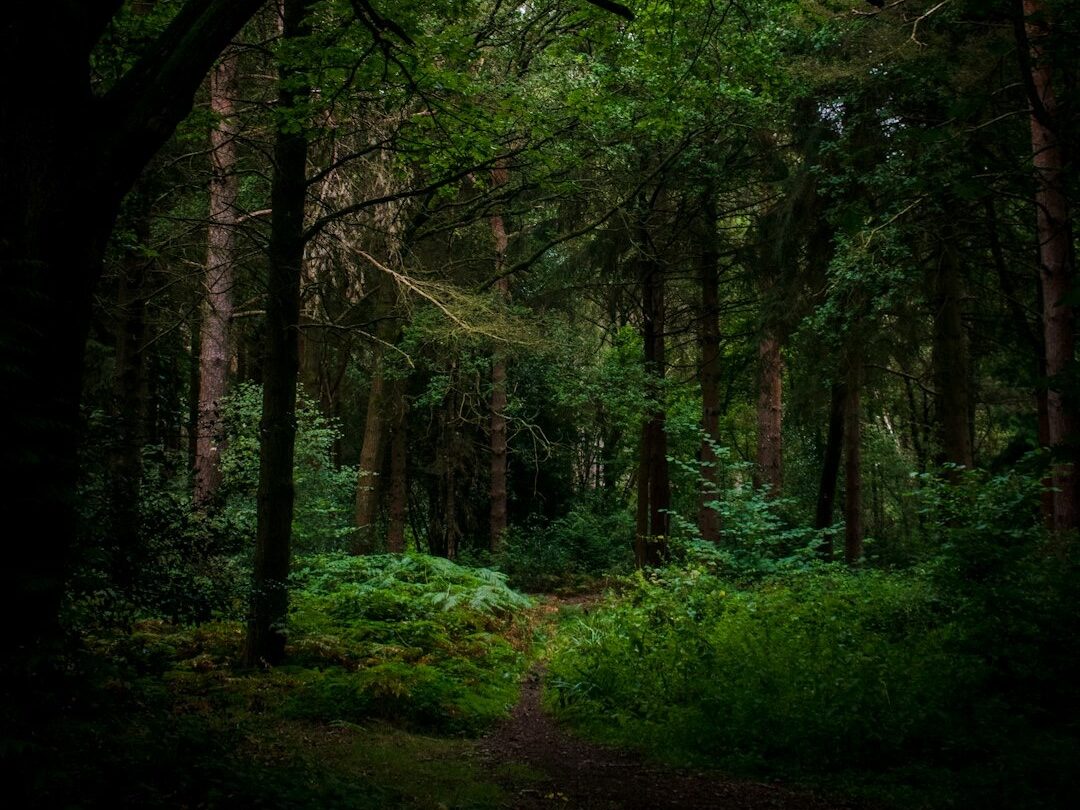The rain that night was fine as ash, muffling the city the way a hand muffles a scream. I took the long way home because routine feels like a spell against things we don’t want to think about, and thinking about the woods behind my childhood house had become a new habit I didn’t consent to.
It started with the messages in the mirror.
I saw the figure again at the end of my street, standing beneath a dead streetlamp. Small for their age. They had my family’s posture and none of its warmth. When I blinked, they were closer; when I looked directly, there was only rain.
In my bathroom, the mirror fogged without warning. Letters scored through:
YOU FORGOT ME.
A lie. I remembered gold thread braided through dark hair. If I make you magic, a young voice had said, you’ll have to take me with you when you leave. I remembered the fort of tarps and branches. The creek. The games. “You don’t have to be alone if you don’t want to.”
I remembered the night everything changed. The night I stopped going to the woods.
I don’t remember what I did.
At 3:11 a.m., my phone was unlocked in my hand. In Notes, a sentence in my childhood cursive:
You promised you’d never leave me behind.
Something breathed against the door, once, like laughter through a nose. Young laughter. Familiar.
By morning, the apartment smelled like wet earth and iron. A neat circle of mud marked the kitchen floor. Not footprints—handprints. Small. Child-sized. Dragging forward as if something hungry had pulled itself from somewhere deep.
My coffee tasted like creek water from a childhood dare. Drink with me, then you’ll see. We always did everything together. Had to. That was the rule.
By noon I was outside my old house. The woods sagged with memory.
In the clearing, tarps had rotted into earth. The creek was a pale scar. The air felt crowded with waiting.
“Do you remember where you buried me?”
A child’s voice, soft as damp leaves. My stomach turned to ice. I turned fast. Nothing there. Only a dip in the earth, poorly filled. A toy shovel jutting up like a snapped rib. The kind of hole a nine-year-old might dig.
My knees hit dirt. My hands moved without permission, scraping, digging. The soil gave like breath.
I found bones first—small, delicate. Not human. Too small. Animal bones, had to be. Then a porcelain bead from a party favour necklace. The kind we’d fought over at birthday parties. Then hair, pale as mushroom undersides, twined around twigs.
I found the doll.
Relief flooded me so hard I almost laughed. A doll. Just a doll. Face carved with a dull knife, mouth too wide. Real hair stitched to its scalp—dark with gold thread braided through. My handiwork. My childish attempt at… what? Making something real?
The laughter behind me wasn’t relief.

The figure stood at the dip’s edge. A child’s height but wrong, stretched. Their skin was greenish white, like roots starved of sun. Their features were familiar but wouldn’t quite resolve, like trying to remember a face from a dream.
“You forgot me,” they said, voice like old rope through a ring. “They made you forget. Said I wasn’t good for you.”
“You’re not…” I started, but couldn’t finish. Not who? Not real?
“You promised. You said my name. You said I could stay.”
They crouched until we were eye level. They smelled like wet bark and pennies and the part of a basement no one cleans.
“You made me real. Every game, every promise, every time you said ‘my best friend’ to anyone who’d listen. You made a door of your belief. Then they slammed it shut.”
A memory pressed forward: my parents’ frightened faces. You’re too old for this. It has to stop.
The name arrived whole in my mind. Was it the name of a sister? Or something I’d invented? Something that had become real?
I said it.
The clearing brightened. Their smile crossed their cheeks, too wide, doll-wide.
“Better. Now they can’t make you forget again.”
The ground shrugged. I slid. Small hands caught my legs—too many hands for one child.
I woke in my bed, mud under my nails. My phone hummed:
Let’s make rules again.
One: See me standing in your eye’s dark side.
Two: Say my name or yours I’ll take to hide.
Three: Leave all doors ajar, both far and wide—I live in spaces where the shut out things abide.
Nights divided: 2:08 when the stove turned on, 4:44 when earth-smell rose through floorboards. I woke with dirt between my teeth, the name under my tongue tasting metallic.
I had to know. I called my sister.
She answered on the second ring—alive, real, adult. Relief and terror warred in my chest.
“Do you remember,” I asked carefully, “when I was little… when I had a friend who wasn’t there?”
The silence stretched. “Mom and Dad said never to mention it.” Her voice dropped. “You used to set a place at dinner. Made us wait for them before eating. You’d speak in both voices, have whole conversations. It scared Mom. Dad said it was getting dangerous—you were starting to believe they were real.”
“What happened?”
“They made you stop. Took you to someone. Made you…” she paused. “Made you put it away. Literally. You dug a hole in the woods. Said you were burying ‘the part that gets hungry.’ After that, you never mentioned them again. We all pretended it never happened.”
“Did I ever say their name?”
“Every day. Until the day you forgot.”
The phone rang immediately after I hung up: Unknown. In the reflection, the outline stood close enough to touch.
“Your family lied,” it said softly. “I was real. You made me real. And real things don’t stay buried just because you forget them.”
A door opened in my wall. Beyond it: trees, water, and something waiting.
“I can’t keep you.”
“You don’t keep me. You feed me. You always have. Every lonely thought. Every time you wished for someone who’d never leave.”
New photographs filled my frames. Child-me beside a blur that refused focus. Sometimes the blur wore my clothes. Sometimes I wore its smile. My mother’s handwriting on one: Please make it stop.
“Do you want this to end?” they asked.
“Yes.”
“You know how.”
The knowing arrived: our games always had rules. What you do, I do too. Where you go, I follow through.
“Say you’ll come back where you belong.”
“No.”
“Then make someone else. Anyone. A mouth is a door. Doors open both ways. Or…” they tilted their head, “I could visit your sister. She remembers my name now, thanks to you.”
“No!”
They smiled. “Then it will be you. I’ve been patient. I learned from the best.”
The walls moved closer each night. The apartment borrowed proportions from a child’s fort—lower, tighter, dark.
On the seventh night, they stood at my bed’s foot.
“You made me from loneliness and need. Fed me with belief until I breathed. Your parents saw me that last night—just for a moment, in your bedroom doorway. That’s why they made you bury me. But you can’t bury something you’ve named. Not really.”
“You’re not real,” I tried.
“I’m as real as the promises you made. As real as the games we played. As real as the part of you that still, after all these years, needs someone who will never, ever leave.”
The bed softened. Hands rose through cloth—child’s hands, but too many. The cold that took me wasn’t cold that hurt—it was cold that wanted, that had been waiting in the dark spaces between childhood and forgetting.
They leaned close, their voice mine at nine years old and something older wearing it:
“New rules. One: We eat from the same deep well. Two: No doors between us—share one shell. Three: Remember always, never tell.”
In the mirror, my reflection smiled with a mouth too wide. Behind it, something small pressed many hands against the glass from inside.
When the floor closed, it closed gently, the way a parent shuts a door on something they can’t bear to see.
I write this with fingers already translucent. They’re becoming like mine were at nine—small, eager, ready to play forever. The mud by your door isn’t from rain. The figure at your street’s end isn’t a stranger.
Every child knows the secret: if you believe hard enough, anything becomes real.
And real things don’t forget.
Even when you do.


Leave a Reply